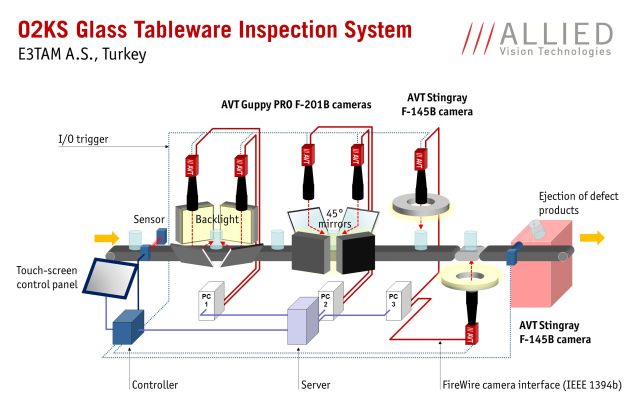Sisecam Pasabahce of Turkey is a world-leading manufacturer of glass tableware. The company has been producing consumer glass products since 1935 and serving international markets since 1961. Pasabahce started automating its production lines as early as 1955, pioneering industrial automation in the glassware industry.

Today, Pasabahce offers a wide range of glass products in various designs both for consumer and professional uses: glasses, bowls, pitchers, cups, ashtrays, etc.
Glass – a challenging product to inspect
As in any mass-production industry, automated inspection and quality control using industrial image processing can significantly improve quality assurance and productivity of glass tableware manufacturing. However, inspecting glass brings specific challenges because of the nature of the product itself.
Glass is very challenging to inspect because of its physical and optical properties: it is transparent, reflects and refracts light and may act as a lens depending on its shape. This makes it particularly difficult to capture digital images that can be processed by software to detect defects. Additionally, glass is fragile and must be handled with care.
To meet these challenges, Pasabahce selected O2KS, an innovative machine vision system by E3TAM specifically designed for the inspection of glass. Headquartered in Istanbul, E3TAM is a leading provider of machine vision solutions in Turkey and is also Allied Vision Technologies’ distribution partner in the country.
O2KS Optical Glass Tableware Inspection System
O2KS – A versatile automated glass inspection system
O2KS is a completely autonomous inspection unit designed to perform quality control tasks on glass tableware on the production line without slowing down the manufacturing process. The system can handle 4 items per second and even more depending on the individual configuration, ensuring a high level of productivity.
O2KS can detect a wide variety of flaws such as cracks, wavy rims, blisters, overpress, scratches, and more on various product sizes and shapes within its inspection range (up to 300 mm height and 110 mm diameter).
The system presents itself as a closed inspection cabin which guarantees a controlled lighting environment. Items enter the cabin on a conveyor belt and move through four inspection stations.
At the first two steps, lateral images of the glass are captured by four Guppy PRO F-201B digital cameras from Allied Vision Technologies – two on the left and two on the right side of the conveyor belt. The cameras are fitted with large telecentric lenses. In order to keep the system as compact as possible on both sides of the conveyor belt, they are oriented vertically above 45°-angled mirrors. Each camera captures at least a 90° viewing angle of the object, so that the 4 images combined provide a 360° lateral view of the glass for inspection.
The next two steps are dedicated to the inspection of the top and bottom of the glass. Two AVT Stingray F-145B cameras are positioned above and below the conveyor belt. The image captured is used to inspect the rim and base of the glass and check their geometry and flawlessness.
After leaving the inspection cabin, the glasses are either conveyed further down the production line or rejected if a defect was detected.
High-tech inspection for maximum precision
The Guppy PRO F-201B is a very small and robust machine vision camera with a 2-Megapixel monochrome sensor from Sony. It delivers up to 14 frames per second (fps) at full resolution which is fast enough to capture the 4 images per second required. The Stingray F-145B is a richly featured and highly modular machine vision camera fitted with a 1.4 Megapixel Sony CCD-Sensor. It delivers up to 16fps at full resolution. Both cameras are connected to the host-computer via an IEEE 1394b high-speed FireWire interface. “We selected the AVT cameras because of their outstanding price/performance ratio”, says Ali Sami Gözükýrmýzý, Development Engineer at E3TAM. “They are really solid and great cameras for industrial inspection”.
Because of the physical properties of glass, designing the appropriate lighting was crucial for the accuracy and reliability of O2KS. “We developed our own hybrid LED illumination panels”, explains Ali Sami Gözükýrmýzý. “This backlight contains LEDs placed in different angles and the pattern of LEDs was designed to achieve maximum contrast but minimum shadows and reflections on the glass”.
The images captured by the cameras are analyzed by the O2KS software, the result of 7 years of on-going research and development by E3TAM. O2KS relies on NI LabView and is able to detect up to 20 different flaws with a precision of 0.6 mm. The system is extremely versatile and can inspect products with various shapes, tumble or stemware, etc. The user interface has been designed to be user-friendly and flexible both for operators in daily production and administrators for easy configuration. The type of glass to be inspected can be changed and set up via the touch-screen panel within minutes. If needed, the E3TAM support team can perform maintenance or support tasks remotely via a network connection.
Award-winning glass inspection system
Twenty pieces of E3TAM’s O2KS glass inspection system have been installed at Pasabahce’s production facilities for quality control in and outside Turkey. “We are very satisfied with O2KS”, says Dr. A. Yüksel Soykut, Business Development Manager at Pasabahce A.Þ. “The systems have been working efficiently and completing their tasks successfully”.
In 2012, TESID, the Turkish Electronic Manufacturers Association rewarded E3TAM with an Innovation and Creativity Award for the O2KS glass inspection system, confirming its technology leadership in the worldwide glass industry.